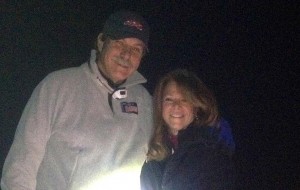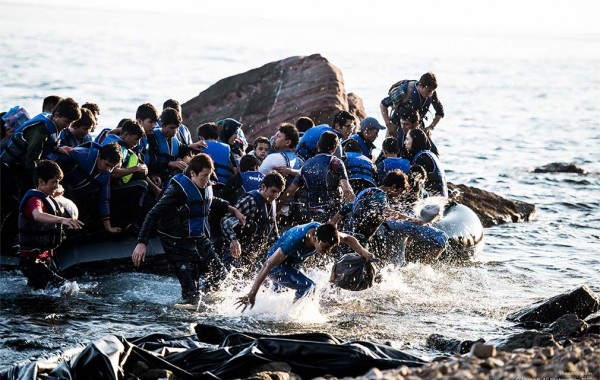By Woody Freiman ’77, P’13
On a starry night last December, we drove along a one-lane road that hugs the rocky coastline of the Greek island of Lesvos. We parked tight to a wall and, guided by the faint light of a dying fire, crossed the narrow roadway onto a deserted beach. The sliver of moon made no impression on the black sea. The lights from Turkey, only 6 miles away, sparkled eerily in the distance. Water lapped at the carcass of an abandoned ship rotting at water’s edge. There were three of us on beach duty that night: myself, my wife, Paulette Douglas, and Jane Marriott from Devon, England — who, like us, had just arrived. A chatty local carpenter who wanted to assist the volunteer effort brought firewood, turning the embers into a roaring bonfire. We sat on discarded life vests and remnants of plastic floorboards, counting the streaks of shooting stars.
At approximately 3:00 a.m., our waiting and watching was interrupted by a searchlight from an unseen Greek Coast Guard ship shining into a cove east of us. Our view was blocked by the jagged shoreline, but Jane had a hunch and quickly hiked up the bluff to check it out. Minutes later, Paulette’s phone rang. A breathless Jane told her, “It’s a boat and people are jumping into the water. Call for help.” As I sprinted to catch up with Jane, Paulette phoned a young volunteer from the Netherlands, starting a response team phone chain.
In the few minutes it took me to reach the cove, volunteers seemed to materialize from nowhere: doctors from France, lifeguards from Sweden, transportation coordinators from Germany. Ten yards off the rocks, a two-story wooden boat was listing. Approximately 150 soaking-wet people — each carrying no more than a backpack or plastic bag — were making their way up the steep embankment. Babies huddled in their mother’s arms, elderly people stopped often to catch their breath, and a volunteer helped a pregnant woman into the arms of a doctor.
Paulette led the new arrivals to our campfire, where we wrapped them in emergency blankets and distributed dry socks and water bottles. We masked the anxiety and stress of responsibility we felt with welcoming smiles and feigned self-confidence. A sense of gratitude and relief filled the cold night air as the families and young men were shuttled to a transit center. A tearful Jane intensely hugged a crying young woman whom she’d helped — both afraid to let go.
The three of us were completely humbled and devastated by what we were witnessing. With the beach again deserted but now littered with wet clothes and empty water bottles, we silently awaited sunrise and the next volunteer team.
Since last summer, many similarly dramatic scenes have played out on the Eastern Aegean islands of Greece. More than a million refugees from the Middle East (most from Syria) have arrived in Europe since last year; more than 500,000 have passed through Lesvos. Greece is not their destination; it is an entry point into the European Union, where they hope they will be offered a safe haven. Each day, anywhere from 1,000 to 6,000 desperate people flee the horrors of their homelands, making the dangerous crossing to Lesvos. At the mercy of gun-toting Turkish smugglers, they pay approximately $1,500 per person to pile into barely seaworthy vessels. Motors give out, and many boats capsize or sink because of the weather, waves, or overcrowding. More than 1,000 refugees — many of them children — have died during these 6- to 10-mile crossings from Turkey.
Paulette and I were inspired by heart-wrenching stories posted on Facebook by a friend’s daughter who was volunteering on Lesvos, and decided to join the effort for two weeks in early December 2015. (Social media is the chief form of communication behind this worldwide volunteer movement.) We arrived carrying two 25-pound bags of medical supplies donated by the Afya Foundation in Yonkers, in addition to our luggage stuffed with dozens of hats, gloves, warm socks, and blankets we had bought.
Our first full day on the island, we joined a group on a beach cleanup, hauling debris off the rocks and shoreline. We collected discarded life vests and boat wreckage. Our hearts broke as we retrieved the soaked remnants of a child’s stuffed animal. That evening, we attended a brief course by Doctors Without Borders about how to help those suffering from hypothermia. The following night would become our first encounter with a refugee boat.
After that powerful night on Eftalou Beach, we joined the independent Starfish Foundation and spent the next 10 days working different shifts (many of them through the night), sorting clothes, making hundreds of sandwiches, greeting refugees. We worked in the makeshift transit center, where refugees received temporary shelter before being bused to registration centers run by the Greek authorities. We distributed food, clothing, blankets, hygiene products, and diapers, and coordinated loading people onto buses.
It is difficult to describe the emotional weight I felt when looking into the pleading eyes of a mother while trying to quickly provide dry clothes for her children. Of those we assisted, very few spoke English and there were few Farsi or Arabic translators on hand, but the refugees all understood that we were saying “welcome” and in return offered a smile that said “thank you.”

Woody Freiman ’77, P’13 and his wife, Paulette Douglas, spent two weeks in December aiding refugees arriving in Lesvos, Greece. Freiman is vice president of production and programming for the YES Network.
The second week, we worked outside a registration camp at Moria, a former prison that’s surrounded by fences, barbed wire, and Greek soldiers. There, the refugees wait for processing by the Greek authorities, which can take up to six days before they are allowed to purchase a ticket and board a ferry to Athens. There was some housing within the camp for Syrian families, but everyone else had to spend the cold nights outside in an old olive grove, which came to be called Afghan Hill. Volunteers set up hot-food and chai tea tents, clothing distribution, a medical area, and a children’s art center. I distributed clothes while Paulette worked in the children’s art tent. A Dutch organization supplied small tents as shelter for the Syrian, Iraqi, Afghani, Pakistani, and Iranian refugees, but there were barely enough for all. The evenings were dark, lighted only by small fires made from whatever could be scavenged. We could see the trauma and worry on the refugees’ faces, so we focused on offering a helping hand and any physical comforts we could provide. A number were struggling, having survived while witnessing family members or others drown on the treacherous crossing.
It is both tragic and frustrating that there is no plan from the United Nations or the European Union for how to aid these desperate people who have risked everything in search of safety for their families. But we were inspired by the volunteers from around the world who put their lives on hold in order to help. Some may question, given the politically complicated and overwhelming situation, whether individual efforts actually accomplish anything. I believe the answer is clear, and I ask: How could we not do something?







